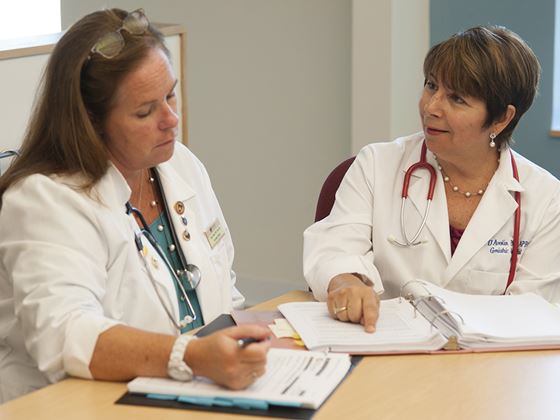Nursing Administrator Certificate (Post-Master's)
-
Program Overview
The nurse administrator certificate prepares you for a managerial role in hospitals, long-term care facilities, community service agencies, ambulatory care facilities, governmental agencies, and corporations.
In the nurse administrator certificate program, you will develop your organizational, analytic, strategic planning, financial, human resources, and evaluation skills in the role of a nurse leader. Coursework focuses on developing core knowledge related to the domains of practice such as: delivery of care; legal, regulatory and ethical issues; health care economics; health care environment; and professional practice. The nurse administrator courses focus on organizational and leadership theories, regulatory standards, risk management, quality assurance, strategic planning, and concepts of human resource management. Courses are offered in a flexible and 100% online format.
The nurse administrator internship course provides the opportunity to integrate knowledge and skills learned in theory courses into the real-world setting. Internship placements are arranged individually through the Cummings School of Nursing and Health Sciences. Experiences are selected with the student to meet course and personal objectives in academia and in organizations.

-
Curriculum
Nurse Administrator Certificate
Curriculum Requirements - Total Credits Required: 15
-
NUR 510 - Organization and Structure of Nursing Leadership (Cr: 3)
-
NUR 526 - Nurse as the Administrator (Cr: 3)
-
NUR 532 - Administration: Practice and Quality Outcomes (Cr: 3)
-
NUR 585 - Masters in Nursing Internship in Administrator Role, Educator Role and or Global Health Role (Cr: 6)
Nurse Educator Certificate
Curriculum Requirements - Total Credits Required: 15
-
NUR 505 - Curriculum Design, Course Development, and Program Evaluation (Cr: 3)
-
NUR 561 - Nurse as the Educator (Cr: 3)
-
NUR 565 - Teaching Methods: Principles of Teaching (Cr: 3)
-
NUR 585 - Masters in Nursing Internship in Administrator Role, Educator Role and or Global Health Role (Cr: 6)
Family Nurse Practitioner Certificate
Curriculum Requirements - Total Credits Required: 27
-
NUR 550 - Pathophysiology of Human Disease for Advanced Nursing Practice (Cr: 3)
-
NUR 551 - Comprehensive Health Assessment and Clinical Diagnostic Decision Making (Cr: 3)
-
NUR 562 - Advanced Pharmacotherapeutics for Family Nurse Practitioner (Cr: 3)
-
NUR 566 - Seminar for the Professional Nurse Practitioner (Cr: 2)
-
NUR 567 - Primary Care of the Childbearing Family (Cr: 3)
-
NUR 568 - Primary Care of the Childbearing Family Practicum (Cr: 5)
-
NUR 569 - Primary Care of the Adult and Geriatric Patient (Cr: 3)
-
NUR 570 - Primary Care of the Adult and Geriatric Patient Practicum (Cr: 5)
Learning Outcomes
Upon completion of the program, students will:
- Integrates scientific findings from nursing and other disciplines for the continual improvement of nursing care across diverse settings.
- Demonstrate a repertoire of skills and strategies to implement organizational and systems leadership critical to the promotion of high quality and safe patient care.
- Applies the methods, tools, performance measures, and standards related to quality, as well as quality principles within an organization.
- Apply research outcomes within the practice setting, to resolve practice problems, working as a change agent to disseminate results.
- Utilize patient-care technologies to deliver and enhance care, using communication technologies to integrate and coordinate care
- Integrates and advocates for ethical, legal and professional standards of practice and intervenes at the systems level through the policy development process.
- Communicates, collaborates, and consults with other health professionals to manage and coordinate care within the Interprofessional team
- Applies and integrates broad, organizational, client-centered, and ethnically and culturally appropriate concepts in the planning, delivery, management, and evaluation of evidence-based clinical prevention and population care including services to individuals, families, and aggregates
- Influences healthcare outcomes for individuals, populations, or systems through evidenced based nursing practice as well as the ability to integrate knowledge and formulate interventions into both direct and indirect patient care.
Reference: American Association of Colleges of Nursing (2011). The essentials of master's education in nursing. Retrieved from aacnnursing.org/portals/42/publications/mastersessentials11.pdf
View academic catalog and learning outcomes -
NUR 510 - Organization and Structure of Nursing Leadership (Cr: 3)
Accreditation
The Nursing Program is accredited by the Accreditation Commission for Education in Nursing, Inc. (ACEN), 3343 Peachtree Road NE, Suite 500, Atlanta, GA 30326. Phone (404) 975-5000 and Fax (404) 975-5020.